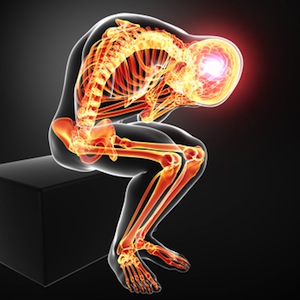 Researchers from the University of California reveal an interesting link between sleeplessness and brain performance in a study published in “Sleep Journal.”
Researchers from the University of California reveal an interesting link between sleeplessness and brain performance in a study published in “Sleep Journal.”
This discovery is significant to all of us, as it shows how lack of sleep impairs our ability to perform daily tasks and responsibilities.
The insomnia study involved 50 study participants. Half of them suffered from insomnia and reported sleeping not more than 6 hours on average. The other 25 were healthy sleepers, having at least 7 hours of sleep on average.
The study group was asked to perform a working memory test (shows the capacity of the brain to process and store short-term memory) while scanning their brains with functioning magnetic resonance imaging (FMRI). They were also asked to perform some concentration tasks to see the activity of the brain.
After assessing the results of the study, researchers noticed that insomnia sufferers showed significantly lower activity in the part of the brain responsible for short-term memory compared to the healthy-sleeper group.
And as the concentration tasks became more difficult, the healthy sleepers showed an overall increase in brain activity compared to the insomnia group.
The insomnia sufferers, however, not only showed less brain activity, but were also unable to “switch off” the brain’s default mode, responsible for wandering minds and poor concentration.
The study once again proves how important healthy sleep is. Without the proper rest, our brains can’t function accordingly; we suffer fatigue and even easy tasks become impossible to complete.

 Multiple Sclerosis
Multiple Sclerosis Banishing Bronchitis
Banishing Bronchitis Gum Disease Gone
Gum Disease Gone Overcoming Onychomycosis
Overcoming Onychomycosis Neuropathy No More
Neuropathy No More The Prostate Protocol
The Prostate Protocol Brain Booster
Brain Booster
 Ironbound
Ironbound
 Solution for Shingles
Solution for Shingles
 The Bone Density Solution
The Bone Density Solution
 The Ultimate Healing Protocol
The Ultimate Healing Protocol
 The Parkinson's Protocol
The Parkinson's Protocol
 The Chronic Kidney Disease Solution
The Chronic Kidney Disease Solution
 Overthrowing Anxiety
Overthrowing Anxiety The Fatty Liver Solution
The Fatty Liver Solution The Hypothyroidism Solution
The Hypothyroidism Solution
 The End of Gout
The End of Gout The Blood Pressure Program
The Blood Pressure Program
 The Oxigized Cholesterol Strategy
The Oxigized Cholesterol Strategy
 Stop Snoring And Sleep Apnea Program
Stop Snoring And Sleep Apnea Program
 The Arthritis Strategy
The Arthritis Strategy The Vertigo & Dizziness Program
The Vertigo & Dizziness Program The 3-Step Diabetes Strategy
The 3-Step Diabetes Strategy Hemorrhoids Healing Protocol
Hemorrhoids Healing Protocol The Erectile Dysfunction Master
The Erectile Dysfunction Master Weight Loss Breeze
Weight Loss Breeze The IBS Program
The IBS Program The Insomnia Program
The Insomnia Program The Migraine and Headache Program
The Migraine and Headache Program The Neck Pain Solution
The Neck Pain Solution The Menopause Solution
The Menopause Solution The Ejaculation Master
The Ejaculation Master The TMJ Solution
The TMJ Solution The Acid Reflux Solution
The Acid Reflux Solution The Fibromyalgia Solution
The Fibromyalgia Solution The Psoriasis Strategy
The Psoriasis Strategy
My name is Jacqueline, my blood pressure is 160/103. Please advice me what to eat and Not. My hear ever beats high i use medicine to lower my blood pressure. The medicine is called NEFILAT RETARD they are small and brown in colour since 2006 and no help. Can these medicine have any side effect in my health. Please advice.
My Dear Friend, that is too long. I have never heard of the medication, but I would let him know it’s not working. Also I am sure you are having six months check up to see how the medicine is working. Also research it to see what harm if any is done to your Kidneys and Liver. After six months you should see some change in your numbers. Good luck.